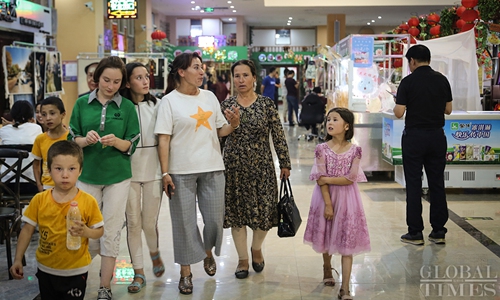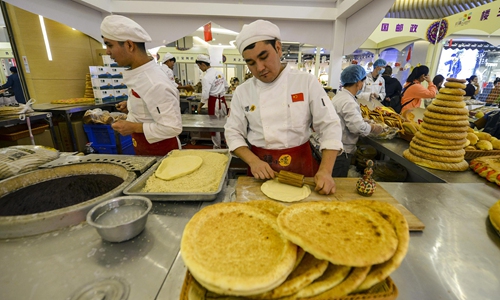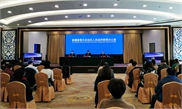Australian agency fabricating ‘Xinjiang labor’ receives fund from US govt: spokesperson

Photo: GT
A report by an Australian think tank on 80,000 Uygurs from Northwest China’s Xinjiang Uygur Autonomous being “forced to work” in factories is “full of suppositions and fabricated stories,” which shows an “obvious ideological prejudice,” the Xinjiang regional government spokesperson said on Monday.Recently, the Australian Strategic Policy Institute (ASPI) issued a report titled Uygurs for Sale, claiming that 80,000 Uygurs had been transferred to factories across China between 2017 and 2019 to further “control” them.
At a press conference on Monday, Eljan Anayti, spokesperson of the Xinjiang regional government, rejected the report as a smear against Xinjiang that is full of suppositions and fabricated stories.
Eljan noted that APSI has long been receiving funds from the US government and arms dealers, and it deliberately smears, vilifies and demonizes China for its investors’ benefit.
“It works with other anti-China forces in the United States to slander and discredit Xinjiang’s efforts in counter-terrorism and deradicalization with false theories full of bias and in disregard of facts. ASPI and its biased position are notorious among many people in Australia who criticize its academic credibility,” Eljan said.
ASPI distorted the normal actions of Southern Xinjiang workers seeking employment in other parts of China to make a better living, calling it “forced labor,” as its aim is to work together with the US in its conspiracy to disentitle Xinjiang workers, suppress Chinese enterprises and affect foreign companies’ confidence in investing in China, Eljan said.
The spokesperson noted at the press conference that after hearing about the report, some employers felt deeply shocked. They said that people who wrote the report did not carry out thorough field investigations and were telling a false story.
The Dong Guang Yidong Electronic Technology Co. Ltd (YDET) issued a statement on the employment of Xinjiang Uygur workers, saying that neither Xinjiang local authorities nor the employers force anyone of them to do anything they refuse to.
They encounter no prejudice in work or daily life, but on the contrary, all their rights to religious belief, ethnic culture and use of ethnic languages are respected by their employers and coworkers, and they are dedicated to their present jobs and want to extend their contracts, according to the statement.

Photo: GT
The spokesperson also noted that to reduce poverty in southern Xinjiang, local authorities have taken active measures to help surplus laborers from poorer households get jobs based on their intentions, such as creating more jobs opportunities at local markets, seeking employment in other prefectures and cities in Xinjiang, or organizing “transferred employment” for them to find jobs in other parts of China through a “pairing-up” support mechanism between Xinjiang and other provinces or municipalities.According to data from Xinjiang, since 2018, the region has realized transferred employment for 151,000 surplus laborers from poor families in southern Xinjiang. Among them, 14,700 people have found jobs in factories and companies in inland Chinese provinces either through introduction from their fellow villagers, guidance by relatives, or allocation by human resources markets to appropriate positions, but none of them are trainees from vocational and education training centers.
Most of them work in the fields of garment and shoe making, electronic or electrical products manufacturing, food processing, catering industry, and automobile assembly packing, and have an average annual income of 45,000 yuan, which is much higher than they could get through farming in southern Xinjiang.
The US Congressional-Executive Commission on China (CECC) has released a report saying forced labor inside and outside of Xinjiang’s vocational education and training centers is “systematic repression” of minority groups in the region.
Since last week, many US lawmakers and politicians have been pushing a bill to put tough limits on imports from Xinjiang.
The US has always fabricated facts about Xinjiang affairs with baseless accusation and profound prejudice. The CECC report and act proposal are the prologue to a new round of smears and slanders about Xinjiang. “Clearly they have made these evil plans in collusion to make up new topics to shift public attention away from their domestic economic, social problems and epidemic crisis,” Rehmanjan Dawut, head of the Department of Human Resources and Social Security in Xinjiang, said at the Monday press conference.
In response to the ASPI report’s accusation that ethnic minority workers from Xinjiang in inland cities are prohibited from participating in religious activities, senior officials from Xinjiang told the Monday press conference that it is totally ignorant and prejudiced to make these remarks.
They noted that in China, citizens’ freedom of religious belief is protected by law regardless of geographical changes. In fact, there are mosques in many inland cities. Followers of Islam among the migrant workers, like their peers back in Xinjiang, can carry out their normal religious practices as they are free from intervention of any organization or individual.




